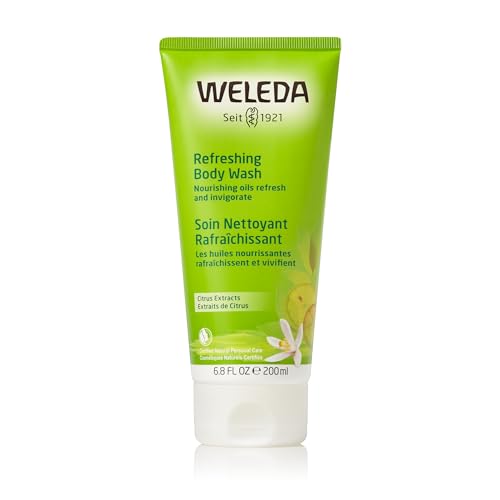
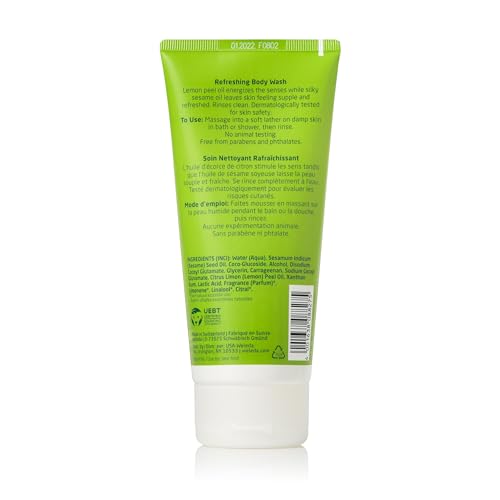
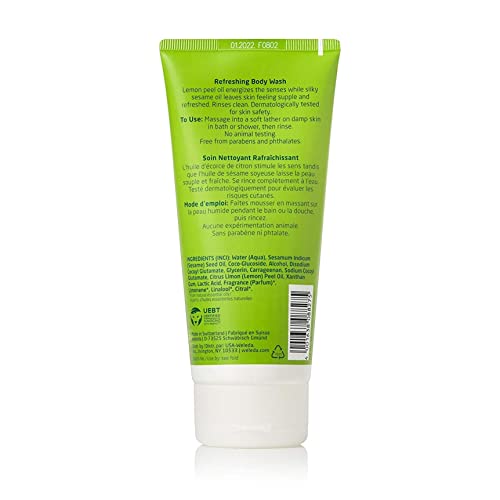
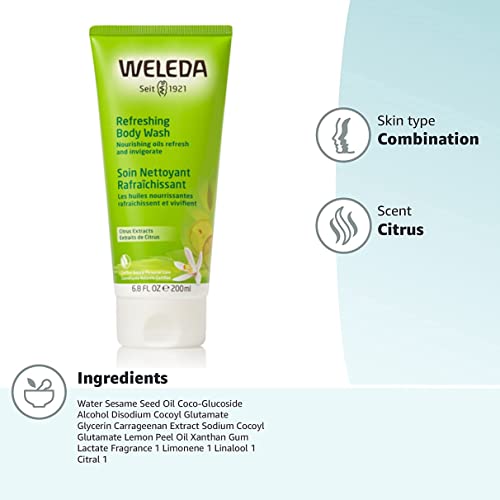

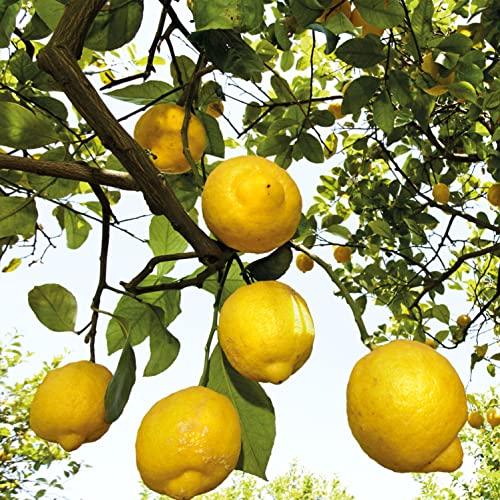
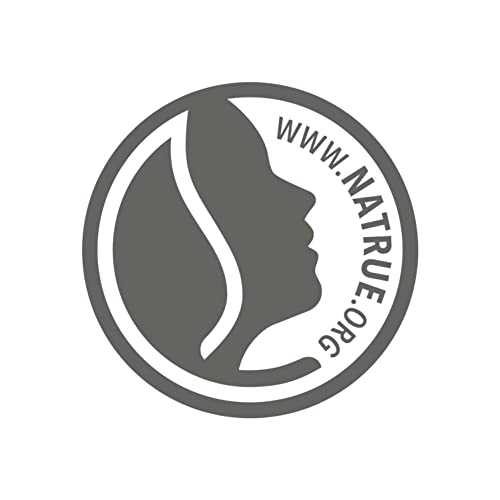

Weleda Citrus Body Wash - Revitalizing Moisture with Lemon & Sesame Oils - 6.8oz


Fragrance
High RiskFragrance refers to a mixture of aromatic compounds used in products to provide scent. It is commonly listed as 'fragrance' or 'parfum' on product labels and can serve various functions, including enhancing user experience and masking undesirable odors.
Sustai Insights
Fragrance offers functional benefits by improving product appeal; however, it poses significant health risks, notably a high likelihood of causing allergies and allergic contact dermatitis. Environmental risks include potential pollution and endocrine disruption, though its overall carcinogenicity is low. Regulatory bodies have noted concerns regarding its use, leading to a high-risk classification. Safe usage practices should be observed, and alternatives such as natural essential oils are recommended for those sensitive to synthetic fragrances.
Linalool
High RiskLinalool is a terpene commonly found in various plants, particularly in lavender and mint. It is primarily used in products for its fragrance and potential antimicrobial properties. Linalool is also utilized in formulations for its ability to enhance the sensory experience of personal care and household products.
Sustai Insights
Linalool offers functional benefits as a naturally occurring fragrance component and may exhibit antimicrobial properties. However, it presents high allergenic potential, with concerns about skin irritation and sensitization. Environmental risks include contamination issues, though it is not classified as a persistent pollutant. Regulatory bodies have noted the need for careful handling due to its allergenic nature. Overall, despite some beneficial attributes, the ingredient carries a high risk profile, warranting cautious use and consideration of safer alternatives.
Limonene
Medium RiskLimonene is a scent ingredient and solvent naturally found in citrus fruits, commonly used in personal care and cleaning products for its fragrant properties. It serves as a flavoring agent and enhances the overall sensory experience of products.
Sustai Insights
Limonene offers functional benefits such as acting as a solvent and fragrance enhancer. However, it carries a high allergenic potential, which can trigger skin or respiratory sensitivities in some individuals. Environmental concerns include moderate persistence and bioaccumulation, along with potential ecotoxicity. Regulatory restrictions necessitate verification in products containing this ingredient. Overall, the risk level is assessed as medium, emphasizing the importance of cautious use, particularly for sensitive populations. Safer alternatives may be considered to mitigate these risks.
Chondrus Crispus (Carrageenan) Extract
Low RiskChondrus crispus (carrageenan) extract is a plant-derived thickening agent sourced from red algae. Commonly used in food and cosmetic products, it serves functions such as stabilizing emulsions and improving texture without imparting flavor or color.
Sustai Insights
Chondrus crispus extract provides functional benefits as a thickener and stabilizer, being biodegradable and derived from renewable sources. Health risks are considered low, with minimal concerns regarding carcinogenicity, allergies, and reproductive toxicity. Environmental risks are also low, with no significant pollutant or bioaccumulative potential. Regulatory bodies have verified its safety for use in cosmetics, though some products may have restrictions. Overall, it is assessed as low risk, making it a suitable ingredient in various formulations.
Xanthan Gum
Low RiskXanthan gum is a polysaccharide, a sugar-based compound produced by the fermentation of glucose or sucrose. It is commonly used as a thickening agent and stabilizer in various food and cosmetic products due to its ability to improve texture and prevent ingredient separation.
Sustai Insights
Xanthan gum serves effectively as a thickener and stabilizer, enhancing product texture and consistency. It is biodegradable and typically derived from renewable sources, supporting sustainability efforts. Health risks are minimal, with low concerns regarding carcinogenicity, allergies, and reproductive toxicity. Environmental impact is similarly low, posing no significant hazards. Regulatory agencies, including the FDA, regard it as safe for use, with no significant restrictions. Overall, xanthan gum is assessed as low risk, making it a suitable ingredient in formulations.
Water
Low RiskWater is a clear, colorless liquid essential for various biological processes. It serves as a solvent in formulations, facilitating the dissolution of other ingredients and enhancing product texture and application. Additionally, water plays a crucial role in hydration and is a key component in many cosmetic and personal care products.
Sustai Insights
Water is an effective solvent and hydrator, contributing to the texture and efficacy of formulations. It is biodegradable and generally regarded as safe, with low concerns regarding carcinogenicity, allergies, and reproductive toxicity. However, excessive water usage can lead to environmental concerns, particularly regarding resource depletion. Regulatory bodies do not impose restrictions on water use in cosmetics. Overall, the risks associated with water are low, making it a safe and essential ingredient.
Sodium Cocoyl Glutamate
Low RiskSodium cocoyl glutamate is a sodium salt of glutamic acid, derived from coconut oil. It serves primarily as a surfactant and mild cleansing agent in cosmetic formulations, contributing to the product's ability to remove dirt and oil while being gentle on the skin.
Sustai Insights
Sodium cocoyl glutamate offers functional benefits as a surfactant, enhancing cleansing efficacy without excessive irritation. It is considered low risk regarding health concerns, including carcinogenicity and allergenic potential. Regulatory assessments indicate no significant environmental hazards or restrictions. Overall, it is a low-risk ingredient, suitable for use in personal care products, with no notable adverse effects or regulatory warnings.
Monosodium Glutamate
Low RiskMonosodium glutamate (MSG) is the monosodium salt of glutamic acid, an amino acid naturally found in various foods. It is primarily used as a flavor enhancer in food products, providing umami taste, which is one of the five basic tastes alongside sweet, sour, bitter, and salty.
Sustai Insights
Monosodium glutamate offers functional benefits as a flavor enhancer, effectively improving taste in various dishes. It is considered low risk regarding carcinogenicity, allergies, and reproductive toxicity, with no significant environmental hazards reported. Regulatory bodies, including the FDA, recognize its safe use. Despite common misconceptions linking MSG to adverse health effects, scientific consensus supports its safety at typical consumption levels. Therefore, the overall risk associated with monosodium glutamate is low, and it can be safely used in food products.
Vegetarian Glycerin
Low RiskVegetarian glycerin, also known as glycerol, is a colorless, odorless, and viscous liquid derived from plant sources. It is primarily used as a humectant, solvent, and emollient in various personal care products, helping to retain moisture and improve texture.
Sustai Insights
Vegetarian glycerin offers functional benefits as an effective humectant, promoting hydration and skin smoothness. It is biodegradable and typically sustainably sourced. Health risks associated with glycerin are low, with no significant concerns for carcinogenicity, allergens, or reproductive toxicity. Environmental risks are minimal, and it is not subject to major regulatory warnings. Overall, the risk level for this ingredient is low, making it a safe choice in formulations. Safe usage practices include ensuring proper concentrations in products, and alternatives such as propylene glycol exist but may have differing properties.
Sesamum Indicum (Sesame) Oil
Low RiskSesamum indicum (sesame) oil is derived from the seeds of the sesame plant. It is commonly used in cosmetic formulations due to its emollient properties and ability to nourish the skin. This oil is rich in fatty acids and antioxidants, contributing to its effectiveness in various skincare products.
Sustai Insights
Sesame oil offers several functional benefits, including moisturization and nourishment for the skin, along with potential antioxidant properties. It is generally regarded as safe, with low concerns regarding carcinogenicity, allergies, and reproductive toxicity. Environmental risks are minimal, and the oil is not known to be bioaccumulative. Regulatory bodies do not impose significant restrictions on its use. Overall, sesame oil poses a low risk, making it a viable ingredient in cosmetic formulations, although consumers should consider potential allergies and choose responsibly sourced products.
Citrus Limon (Lemon) Peel
Low RiskCitrus limon (lemon) peel is derived from the outer skin of lemons and is commonly used in cosmetic formulations for its aromatic properties and potential skin benefits. It serves primarily as a fragrance agent and may also provide antioxidant effects.
Sustai Insights
Citrus limon (lemon) peel is valued for its aromatic contributions and potential antioxidant properties, which can enhance product appeal. It has a low risk of adverse health effects, including low concerns for carcinogenicity, allergies, and irritation. Environmental risks are minimal, with no significant evidence of bioaccumulation or pollution. Regulatory assessments indicate no restrictions on use. Overall, it is considered low risk, and safe usage practices should be maintained. Alternatives may include other citrus peels or natural fragrance compounds.
Chondrus Crispus (Carrageenan) Extract
Low RiskChondrus crispus (carrageenan) extract is a plant-derived thickening agent sourced from red algae. Commonly used in food and cosmetic products, it serves functions such as stabilizing emulsions and improving texture without imparting flavor or color.
Sustai Insights
Chondrus crispus extract provides functional benefits as a thickener and stabilizer, being biodegradable and derived from renewable sources. Health risks are considered low, with minimal concerns regarding carcinogenicity, allergies, and reproductive toxicity. Environmental risks are also low, with no significant pollutant or bioaccumulative potential. Regulatory bodies have verified its safety for use in cosmetics, though some products may have restrictions. Overall, it is assessed as low risk, making it a suitable ingredient in various formulations.
Limonene
Medium RiskLimonene is a scent ingredient and solvent naturally found in citrus fruits, commonly used in personal care and cleaning products for its fragrant properties. It serves as a flavoring agent and enhances the overall sensory experience of products.
Sustai Insights
Limonene offers functional benefits such as acting as a solvent and fragrance enhancer. However, it carries a high allergenic potential, which can trigger skin or respiratory sensitivities in some individuals. Environmental concerns include moderate persistence and bioaccumulation, along with potential ecotoxicity. Regulatory restrictions necessitate verification in products containing this ingredient. Overall, the risk level is assessed as medium, emphasizing the importance of cautious use, particularly for sensitive populations. Safer alternatives may be considered to mitigate these risks.
Xanthan Gum
Low RiskXanthan gum is a polysaccharide, a sugar-based compound produced by the fermentation of glucose or sucrose. It is commonly used as a thickening agent and stabilizer in various food and cosmetic products due to its ability to improve texture and prevent ingredient separation.
Sustai Insights
Xanthan gum serves effectively as a thickener and stabilizer, enhancing product texture and consistency. It is biodegradable and typically derived from renewable sources, supporting sustainability efforts. Health risks are minimal, with low concerns regarding carcinogenicity, allergies, and reproductive toxicity. Environmental impact is similarly low, posing no significant hazards. Regulatory agencies, including the FDA, regard it as safe for use, with no significant restrictions. Overall, xanthan gum is assessed as low risk, making it a suitable ingredient in formulations.
Fragrance
High RiskFragrance refers to a mixture of aromatic compounds used in products to provide scent. It is commonly listed as 'fragrance' or 'parfum' on product labels and can serve various functions, including enhancing user experience and masking undesirable odors.
Sustai Insights
Fragrance offers functional benefits by improving product appeal; however, it poses significant health risks, notably a high likelihood of causing allergies and allergic contact dermatitis. Environmental risks include potential pollution and endocrine disruption, though its overall carcinogenicity is low. Regulatory bodies have noted concerns regarding its use, leading to a high-risk classification. Safe usage practices should be observed, and alternatives such as natural essential oils are recommended for those sensitive to synthetic fragrances.
Water
Low RiskWater is a clear, colorless liquid essential for various biological processes. It serves as a solvent in formulations, facilitating the dissolution of other ingredients and enhancing product texture and application. Additionally, water plays a crucial role in hydration and is a key component in many cosmetic and personal care products.
Sustai Insights
Water is an effective solvent and hydrator, contributing to the texture and efficacy of formulations. It is biodegradable and generally regarded as safe, with low concerns regarding carcinogenicity, allergies, and reproductive toxicity. However, excessive water usage can lead to environmental concerns, particularly regarding resource depletion. Regulatory bodies do not impose restrictions on water use in cosmetics. Overall, the risks associated with water are low, making it a safe and essential ingredient.
Sodium Cocoyl Glutamate
Low RiskSodium cocoyl glutamate is a sodium salt of glutamic acid, derived from coconut oil. It serves primarily as a surfactant and mild cleansing agent in cosmetic formulations, contributing to the product's ability to remove dirt and oil while being gentle on the skin.
Sustai Insights
Sodium cocoyl glutamate offers functional benefits as a surfactant, enhancing cleansing efficacy without excessive irritation. It is considered low risk regarding health concerns, including carcinogenicity and allergenic potential. Regulatory assessments indicate no significant environmental hazards or restrictions. Overall, it is a low-risk ingredient, suitable for use in personal care products, with no notable adverse effects or regulatory warnings.
Monosodium Glutamate
Low RiskMonosodium glutamate (MSG) is the monosodium salt of glutamic acid, an amino acid naturally found in various foods. It is primarily used as a flavor enhancer in food products, providing umami taste, which is one of the five basic tastes alongside sweet, sour, bitter, and salty.
Sustai Insights
Monosodium glutamate offers functional benefits as a flavor enhancer, effectively improving taste in various dishes. It is considered low risk regarding carcinogenicity, allergies, and reproductive toxicity, with no significant environmental hazards reported. Regulatory bodies, including the FDA, recognize its safe use. Despite common misconceptions linking MSG to adverse health effects, scientific consensus supports its safety at typical consumption levels. Therefore, the overall risk associated with monosodium glutamate is low, and it can be safely used in food products.
Vegetarian Glycerin
Low RiskVegetarian glycerin, also known as glycerol, is a colorless, odorless, and viscous liquid derived from plant sources. It is primarily used as a humectant, solvent, and emollient in various personal care products, helping to retain moisture and improve texture.
Sustai Insights
Vegetarian glycerin offers functional benefits as an effective humectant, promoting hydration and skin smoothness. It is biodegradable and typically sustainably sourced. Health risks associated with glycerin are low, with no significant concerns for carcinogenicity, allergens, or reproductive toxicity. Environmental risks are minimal, and it is not subject to major regulatory warnings. Overall, the risk level for this ingredient is low, making it a safe choice in formulations. Safe usage practices include ensuring proper concentrations in products, and alternatives such as propylene glycol exist but may have differing properties.
Linalool
High RiskLinalool is a terpene commonly found in various plants, particularly in lavender and mint. It is primarily used in products for its fragrance and potential antimicrobial properties. Linalool is also utilized in formulations for its ability to enhance the sensory experience of personal care and household products.
Sustai Insights
Linalool offers functional benefits as a naturally occurring fragrance component and may exhibit antimicrobial properties. However, it presents high allergenic potential, with concerns about skin irritation and sensitization. Environmental risks include contamination issues, though it is not classified as a persistent pollutant. Regulatory bodies have noted the need for careful handling due to its allergenic nature. Overall, despite some beneficial attributes, the ingredient carries a high risk profile, warranting cautious use and consideration of safer alternatives.
Sesamum Indicum (Sesame) Oil
Low RiskSesamum indicum (sesame) oil is derived from the seeds of the sesame plant. It is commonly used in cosmetic formulations due to its emollient properties and ability to nourish the skin. This oil is rich in fatty acids and antioxidants, contributing to its effectiveness in various skincare products.
Sustai Insights
Sesame oil offers several functional benefits, including moisturization and nourishment for the skin, along with potential antioxidant properties. It is generally regarded as safe, with low concerns regarding carcinogenicity, allergies, and reproductive toxicity. Environmental risks are minimal, and the oil is not known to be bioaccumulative. Regulatory bodies do not impose significant restrictions on its use. Overall, sesame oil poses a low risk, making it a viable ingredient in cosmetic formulations, although consumers should consider potential allergies and choose responsibly sourced products.
Citrus Limon (Lemon) Peel
Low RiskCitrus limon (lemon) peel is derived from the outer skin of lemons and is commonly used in cosmetic formulations for its aromatic properties and potential skin benefits. It serves primarily as a fragrance agent and may also provide antioxidant effects.
Sustai Insights
Citrus limon (lemon) peel is valued for its aromatic contributions and potential antioxidant properties, which can enhance product appeal. It has a low risk of adverse health effects, including low concerns for carcinogenicity, allergies, and irritation. Environmental risks are minimal, with no significant evidence of bioaccumulation or pollution. Regulatory assessments indicate no restrictions on use. Overall, it is considered low risk, and safe usage practices should be maintained. Alternatives may include other citrus peels or natural fragrance compounds.
Experience the invigorating burst of Weleda Refreshing Citrus Body Wash, a gentle cleanser that revitalizes your skin and senses. Infused with lemon peel and sesame seed oils, this plant-rich formula ensures a refreshing start to your day, while nurturing your skin's natural moisture balance.
- Gentle Cleansing: Formulated with natural ingredients, it gently cleanses without stripping essential moisture, leaving your skin feeling fresh and hydrated.
- Citrus Infusion: The zesty aroma of lemons and oranges uplifts your mood, turning your shower into a refreshing experience.
- Plant-Powered Ingredients: Crafted from flower, fruit, and root extracts, this body wash supports your skin's health without harmful synthetic compounds.
- Easy to Use: Simply apply to a wet loofah or washcloth, lather, and rinse for a quick, effective cleanse.
- Sustainable Choice: Weleda is committed to ethical sourcing and sustainable practices, making this body wash a responsible choice for conscious consumers.
Subscribe & Save with Sustai
- Best Price Guarantee: Always enjoy the lowest prices on sustainable home essentials.
- No Surprises: We’ll notify you before shipping. No hidden fees, ever.
- You’re in Charge: Change, pause, or cancel your subscription anytime with ease.
- Eco-Friendly Deliveries: Our grouped shipments mean less packaging and lower emissions.
Join us on a sustainable journey. Special offers for a limited time! Prices and promotions may change.
Recommended Products
Experience the invigorating burst of Weleda Refreshing Citrus Body Wash, a gentle cleanser that revitalizes your skin and senses. Infused with lemon peel and sesame seed oils, this plant-rich formula ensures a refreshing start to your day, while nurturing your skin's natural moisture balance.
- Gentle Cleansing: Formulated with natural ingredients, it gently cleanses without stripping essential moisture, leaving your skin feeling fresh and hydrated.
- Citrus Infusion: The zesty aroma of lemons and oranges uplifts your mood, turning your shower into a refreshing experience.
- Plant-Powered Ingredients: Crafted from flower, fruit, and root extracts, this body wash supports your skin's health without harmful synthetic compounds.
- Easy to Use: Simply apply to a wet loofah or washcloth, lather, and rinse for a quick, effective cleanse.
- Sustainable Choice: Weleda is committed to ethical sourcing and sustainable practices, making this body wash a responsible choice for conscious consumers.

You can have at most 2 Sustainable Steals products in your cart
Customer Reviews
Customers’ View
Customers appreciate the refreshing and invigorating qualities of Weleda's Refreshing Citrus Body Wash. Many highlight its energizing citrus scent, describing it as both fragrant and uplifting, with one user noting, "The citrus scent is invigorating and it has a texture that just glides over skin!" The moisturizing properties of the body wash also receive positive feedback; users report it lathers well and leaves skin feeling soft and hydrated, with several mentioning its creamy consistency that feels almost like lotion. Additionally, customers value the product's natural ingredients, expressing satisfaction with its purity and lack of harmful chemicals. Overall, this body wash aligns well with the values of environmentally conscious consumers, with many finding it a delightful and effective addition to their personal care routine.
AI-generated from the text of customer reviewsThis product is rated 5.0 of 5.0 stars.
It has received 1 review.




